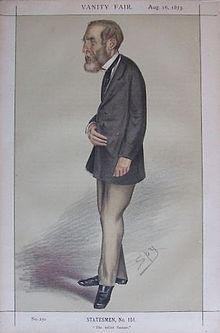Samuel Laing (science writer)
| Samuel Laing | |
|---|---|

|
|
| Born | 12 December 1810 Edinburgh, Scotland |
| Died |
6 August 1897 (aged 86) Sydenham, England |
| Education | St John's College, Cambridge |
| Occupation | Railway administrator, politician, writer |
| Parent(s) | Samuel Laing |
| Relatives | Malcolm Laing (uncle) |
| Awards | Smith's Prize (1832) |
Samuel Laing, (12 December 1812 – 6 August 1897), was a British railway administrator, politician, and writer on science and religion during the Victorian era.
Samuel Laing was born on 12 December 1810 in Edinburgh, Scotland. He was the nephew of Malcolm Laing, the historian of Scotland; and his father, also called Samuel Laing (1780–1868), was a well-known author, whose books on Norway and Sweden attracted much attention. Samuel Laing the younger entered St John's College, Cambridge in 1827, and after graduating as Second Wrangler and Smith's Prizeman, was elected a fellow. He remained at Cambridge temporarily as a coach, before being called to the bar in 1837.
He became private secretary to Henry Labouchere, later 1st Baron Taunton, who was then the President of the Board of Trade. In 1842, he was made secretary to the railway department, and retained this post until 1847. He had by then become an authority on railways, and had been a member of the Dalhousie Railway Commission; it was at his suggestion that the "parliamentary" rate of a penny a mile was instituted. In 1848, he was appointed chairman and managing director of the London, Brighton and South Coast Railway (LB&SCR), and his business acumen showed itself in the largely increased prosperity of the line. He also became chairman (1852) of The Crystal Palace Company, but retired from both posts in 1855.
In 1852, he was elected to Parliament as a Liberal Party candidate in Wick Burghs. After losing his seat in 1857, he was re-elected in 1859, and appointed Financial Secretary to the Treasury; in 1860 he was made finance minister in India. On returning from India, he was re-elected to parliament for Wick in 1865. He was defeated in 1868, but in 1873 he was returned for Orkney and Shetland, and retained his seat till 1885. Meanwhile, he had been reappointed chairman of the Brighton line in 1867, which was now on the point of bankruptcy following the over-ambitious expansion plans of the previous chairman. He continued in that post until 1896, and gradually restored the company to financial health. He was also chairman of the Railway Debenture Trust and the Railway Share Trust.
...
Wikipedia
